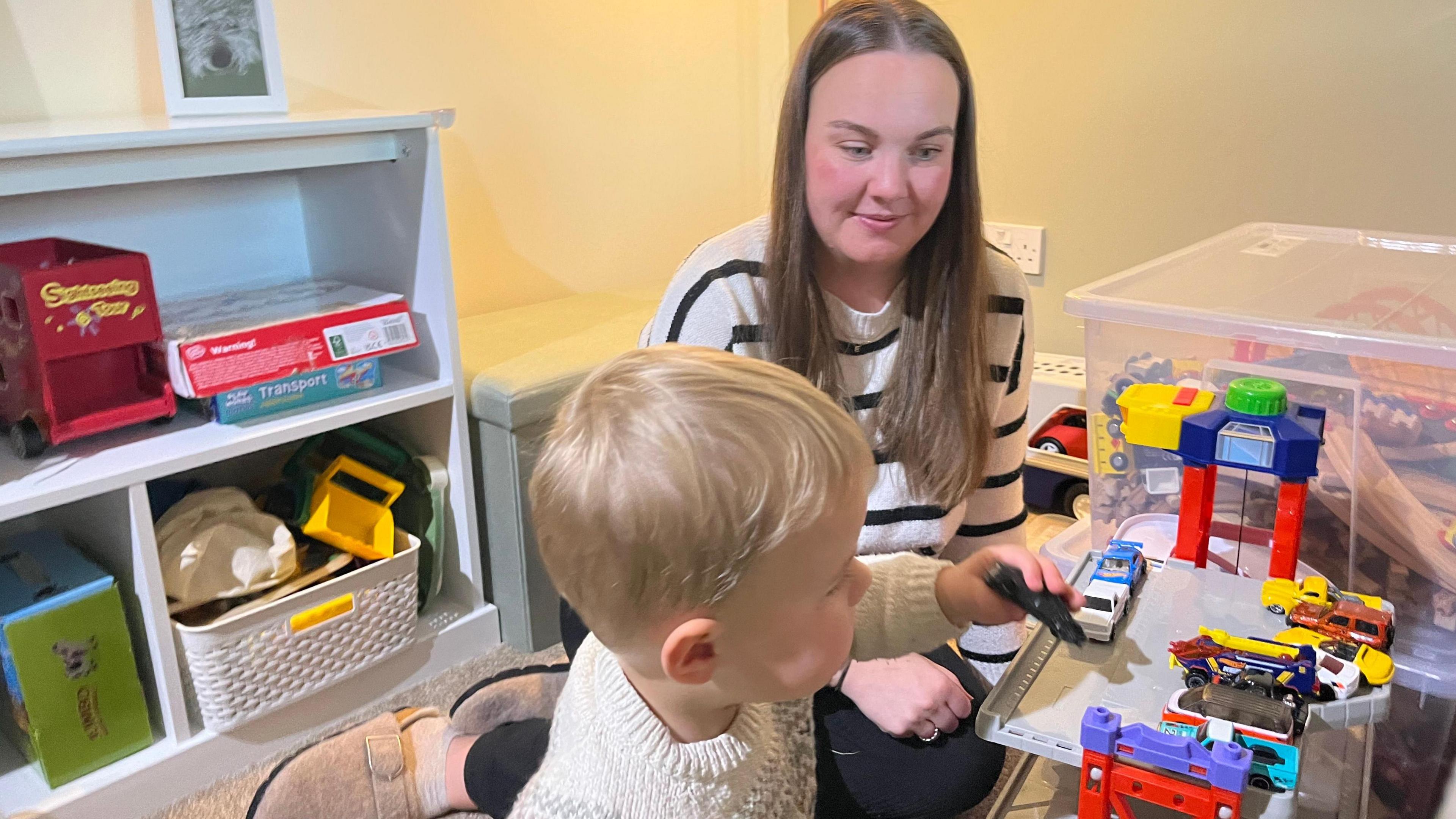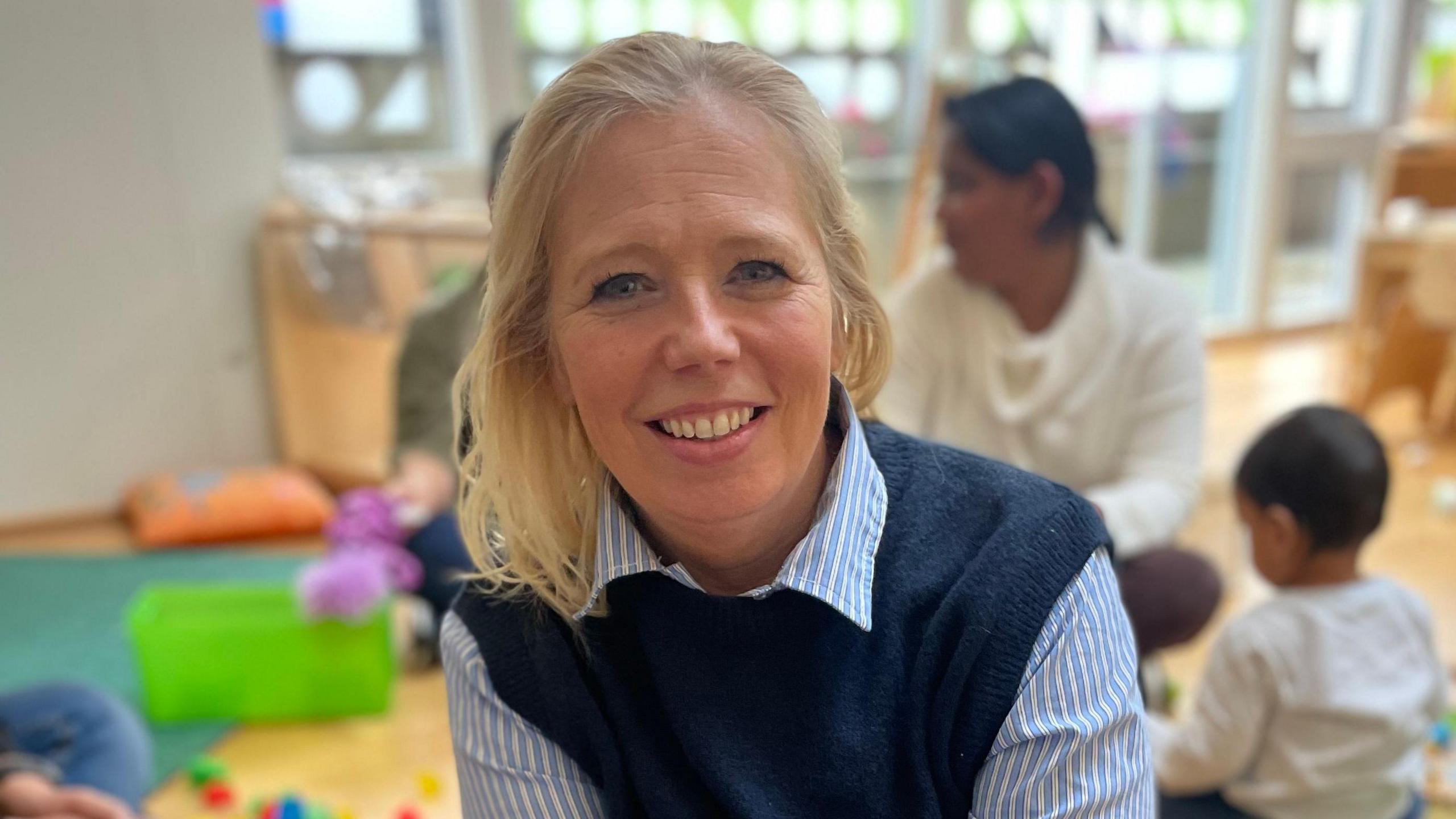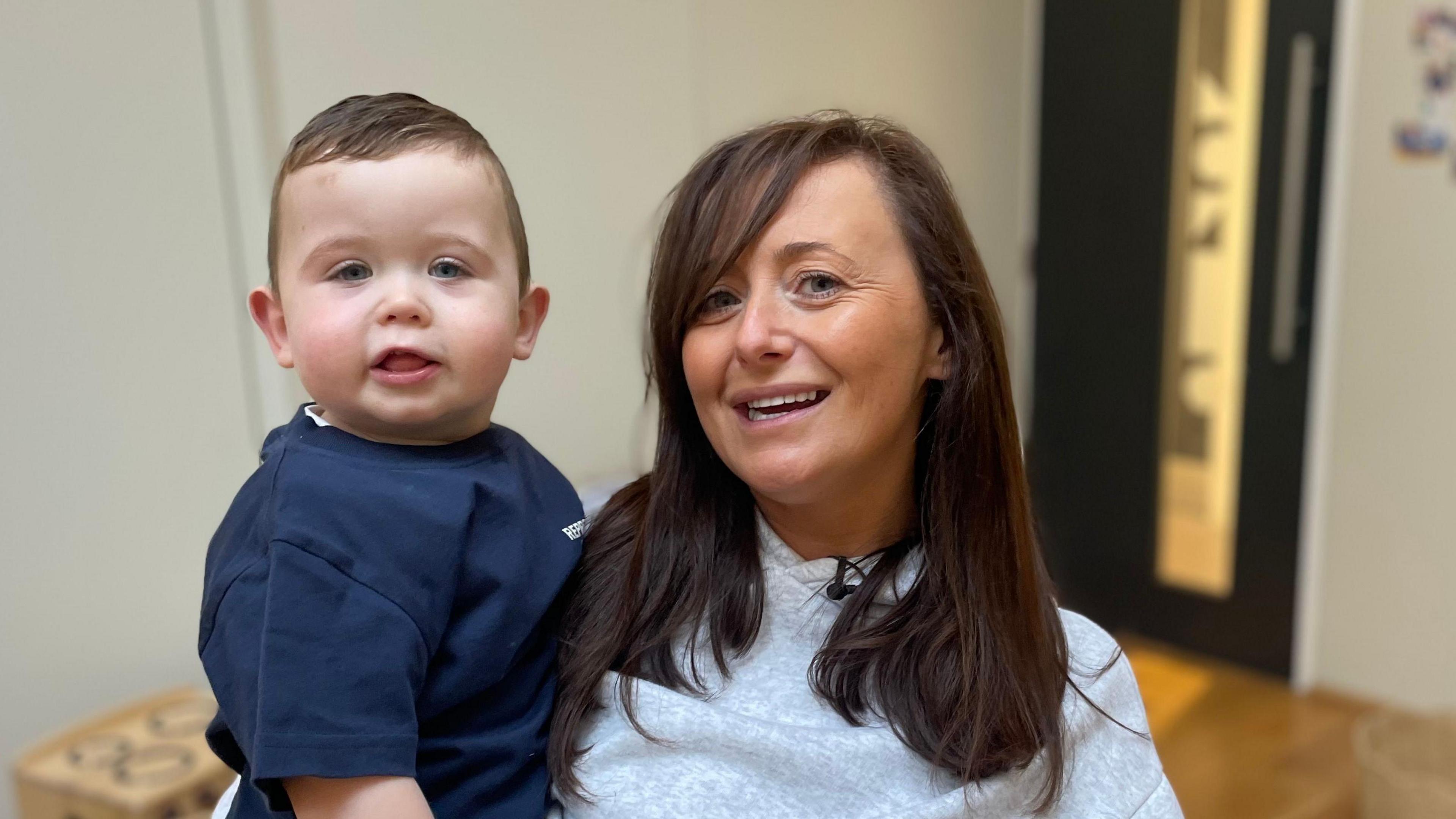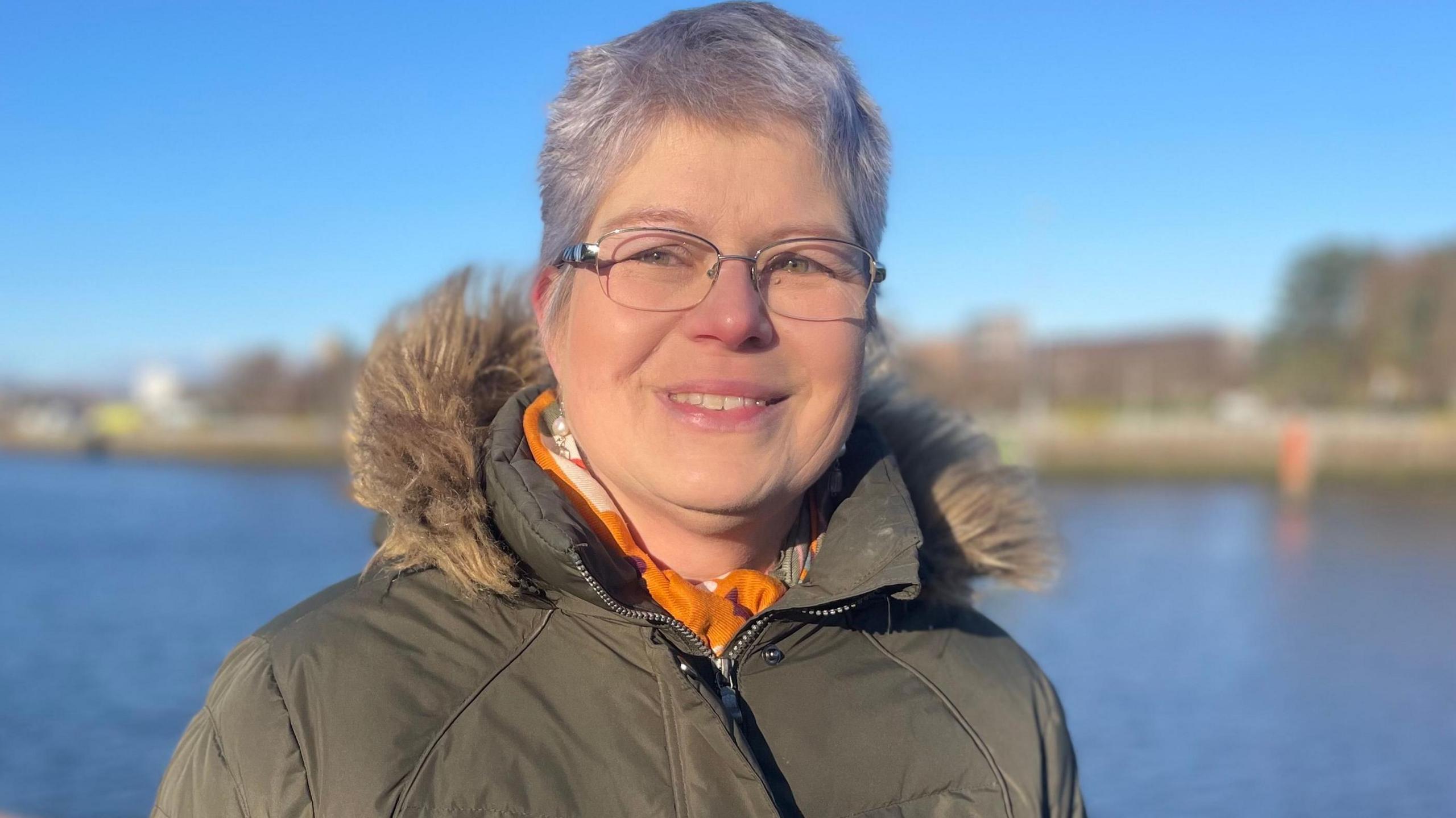'Why do I get less free childcare for my two-year-old than in England?'

Fiona Asquith says there should be an incentive for parents to go back to work
- Published
Earlier this year Fiona Asquith moved back home to the Highlands from Yorkshire with her husband and two-year-old son Euan.
She says she is now paying hundreds of pounds more each month for childcare than she would be if she'd stayed south of the border.
In England, Fiona would qualify for 15 hours of funded childcare per week, cutting down on the extra care she needs to pay for.
However, in Scotland, only about a quarter of two-year-olds currently qualify, usually those from the lowest income families.
The difference between the two arrangements means Fiona and her husband are paying about £300 a month more than they would if they had stayed in Yorkshire.
And next year, when the UK government increases the amount of funded hours in England to 30, the gap will be even greater.
In Scotland, children from the age of three get 30 hours a week of free childcare during term time, regardless of their parents’ working status
However, the SNP’s 2021 manifesto committed to expanding free early years childcare to all one and two year olds.
Currently it only applies to two-year-olds whose parents receive certain benefits or have experience of care.
Fiona says she currently can't afford to have a second child
Fiona, who now lives in Alness in Easter Ross, told BBC Scotland News: "I feel like there should be an incentive for parents to go back to work and contribute to the economy, as well as for their own wellbeing.
"But for some people the books won’t balance."
She says she needs to pay for two and a half days of childcare for Euan, with her mum helping out for a further half a day.
"We currently pay about £600 a month for childcare, but if we had stayed where we were living in England we would be paying about £300 at this point," she said.
"And we’d be saving a further £200-£300 in March.”
As a result, the couple say they have decided they cannot currently afford to have a second child.
In September, the UK government began offering 15 hours of funded childcare to eligible working parents in England with a child over nine months old for the first time. That will increase to 30 hours from next year.
More than 8,000 people have signed a petition calling for the Scottish government to match the arrangements available in England, where about 70% of two-year-olds are entitled to free care.
A Scottish government spokesperson said: "Scotland is the only part of the UK to already offer 1,140 hours a year of funded early learning childcare to all three and four-year-olds and eligible two-year-olds regardless of their parents’ working status."
They said the Scottish government had also provided £16m over two years for six "early adopter communities" across Scotland, where the aim is promote equality rather than prioritising those whose parents are working.

Fiona Carmichael says the Barmulloch project is not a traditional nursery drop-and-go service
One of the projects funded by the scheme is in Barmulloch in Glasgow.
There is no cost to take a child to the centre and some are under a year old, but it is not the kind of nursery where a parent can leave their toddler while they go to work.
"This isn’t a traditional nursery drop-and-go service," says Fiona Carmichael, head of services at Early Years Scotland, which runs the project.
"At the very heart of it is family wellbeing."
She says: "We allow parents an hour and a half of wellbeing time so they are able to go away and do something like English classes or use the computing room for IT skills or CV-building.
"Our staff are here to help people fill in things like nursery forms or help people sign up for housing benefit or other entitlements."
The support offered by the project can also help with family budgets in other ways.
"We frequently hear that the cost of childcare is at times really not manageable for families," Ms Carmichael says.
"Even when we provide a breakfast and a lunch for some families, it gives a bit of help to their week."

Gillian moves her shifts around to be able to attend the centre with son Frankie
Gillian is one of the parents who attends the Barmulloch project.
She moved her shifts around to be able to attend three times a week with her son Frankie while his dad is in hospital being treated for cancer.
"It’s not just for Frankie, it’s for myself," she says.
"I’ve met lots of people who I meet outside as well, on the days when we’re not here.
"It’s that relationship for mums as well as for the kids."
Gillian says the centre allows parents to get "a bit of a breather".
"Everyone can join in so it makes me less isolated," she says.
"It gives us a bit of normality."
Funded hours
Charities say a lack of childcare is still the biggest barrier to re-entering work, particularly for new mothers.
But Carole Erskine from the charity Pregnant Then Screwed says that there are not enough places, staff or training available to expand provision in Scotland.
She said we are in danger of breaking the entire system if we commit to more funded hours without the resources being in place.
Ms Erskine says comparisons with the investment in England should be made with caution.
Ahead of the implementation of the scheme there, the charity's research found almost a quarter (23%) of parents said they couldn't afford to access free childcare hours because it meant they had to pay top-up fees for things like meals, nappies, sun cream or trips.
"That money has gone to the private sector but in many occasions it hasn't been enough," Ms Erskine says.
"While to a lot of parents in Scotland funded childcare from nine months sounds amazing, the reality on the ground is that parents aren't often seeing the benefit when it comes to saving them money."

Dr Steffi Keir says the differences between childcare provision in the two nations can also confuse parents
Dr Steffi Keir, a policy adviser for Save the Children, says the differences between childcare provision in the two nations can also confuse parents - and that it is not always easy to access regardless of the age limits.
She says the good thing about the system in Scotland was that it does give families a choice.
"We know that good quality early learning and childcare is what actually improves outcomes for children and that needs to be baked into any decisions around childcare,” she says.
Dr Keir says that the investment of the UK government in childcare means the Scottish government will receive an extra £320m via the Barnett formula and it is up to them to weigh up how to spend it.
"There is absolutely no obligation to spend this money on childcare," she says.
"The first minister says there’s a razor sharp focus on reducing child poverty.
"One thing they could consider doing is to increase the Scottish Child Payment because that means money going directly into the pockets of families who are struggling to make ends meet."
How does funded childcare compare across the UK nations?
30 hours a week during term time for ALL three-year-olds up to starting school, regardless of parents’ work or benefits
Two-year-olds whose parents receive certain benefits or have experience of care, regardless of their parents’ working status
Pilot schemes in ‘Early Adopter Communities’ to test models of family support ahead of further expansion
Working parents can get:
15 hours free childcare for nine-month-olds and above
30 hours free childcare for three and four-year-olds
30 hours free childcare for all under-fives from September 2025
To qualify for the new hours, the majority of parents must earn more than £9,518 but less than £100,000 per year
Those on certain benefits can already get:
15 hours free childcare for two-year-olds
15 hours free childcare for three and four-year-olds
If you do not work, you might still be eligible for 30 hours of free childcare if your partner works, or you receive certain benefits.
Some parents can get 12.5 hours of free childcare a week for children aged two years old under the Flying Start Scheme, currently only available in particular local authority areas, but being expanded
Up to 30 hours of free childcare a week for children aged three and four under the childcare offer for Wales. The 30 hours is made up of 10 hours a week of early education and a maximum of 20 hours a week of childcare for working parents dependent on salary and benefits.
The Northern Ireland Childcare Subsidy Scheme offers a 15% childcare subsidy on top of the 20% granted by the UK government, both of which are capped.
All parents of three and four-year-olds can apply for at least 12-and-a-half hours a week of funded preschool education during term time.